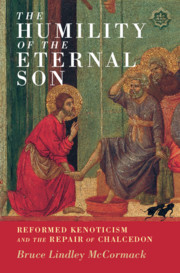Book contents
- The Humility of the Eternal Son
- Current Issues in Theology
- The Humility of the Eternal Son
- Copyright page
- Dedication
- Dedication
- Contents
- Acknowledgments
- Prologue to a Trilogy of Works
- Introduction
- Part I A Critical History of Kenotic Christologies and Their Antecedents:
- 1 Chalcedon and Its Legacy
- 2 Divine Kenosis as Either Depotentiation or Divestment
- 3 Divine Kenosis as Proper to the Eternal Son
- 4 The Post-Barthian Temptation
- Part II Returning to Scripture
- Part III Repairing Chalcedon
- Select Bibliography
- Names Index
- Concepts Index
3 - Divine Kenosis as Proper to the Eternal Son
Attempts to Repair Chalcedon
from Part I - A Critical History of Kenotic Christologies and Their Antecedents:
Published online by Cambridge University Press: 19 November 2021
- The Humility of the Eternal Son
- Current Issues in Theology
- The Humility of the Eternal Son
- Copyright page
- Dedication
- Dedication
- Contents
- Acknowledgments
- Prologue to a Trilogy of Works
- Introduction
- Part I A Critical History of Kenotic Christologies and Their Antecedents:
- 1 Chalcedon and Its Legacy
- 2 Divine Kenosis as Either Depotentiation or Divestment
- 3 Divine Kenosis as Proper to the Eternal Son
- 4 The Post-Barthian Temptation
- Part II Returning to Scripture
- Part III Repairing Chalcedon
- Select Bibliography
- Names Index
- Concepts Index
Summary
Each of the three theologians treated in this chapter – Karl Barth, Sergei Bulgakov, and Hans Urs von Balthasar – had a deep interest in Christological issues touching upon the divine kenosis. In thinking through the involved issues, they understood themselves to be guided by the “spirit” of Chalcedon. They share the conviction that God and the human should be understood to have been joined together in Christ in a union that is no mere externally realized juxtaposition. But they did not feel themselves bound to retain Chalcedon’s categories. Even more significant is the fact that all three twentieth-century theologians attempt in their differing ways to reconcile divine passibility with a more nearly biblical account of divine immutability.
Keywords
- Type
- Chapter
- Information
- The Humility of the Eternal SonReformed Kenoticism and the Repair of Chalcedon, pp. 100 - 158Publisher: Cambridge University PressPrint publication year: 2021

